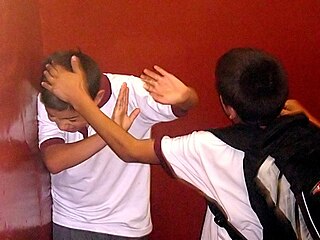Related Research Articles

Conduct disorder (CD) is a mental disorder diagnosed in childhood or adolescence that presents itself through a repetitive and persistent pattern of behavior that includes theft, lies, physical violence that may lead to destruction, and reckless breaking of rules, in which the basic rights of others or major age-appropriate norms are violated. These behaviors are often referred to as "antisocial behaviors", and is often seen as the precursor to antisocial personality disorder; however, the latter, by definition, cannot be diagnosed until the individual is 18 years old. Conduct disorder may result from parental rejection and neglect and can be treated with family therapy, as well as behavioral modifications and pharmacotherapy. Conduct disorder is estimated to affect 51.1 million people globally as of 2013.
Antisocial personality disorder, sometimes referred to as dissocial personality disorder, is a personality disorder characterized by a limited capacity for empathy and a long-term pattern of disregard for or violation of the rights of others, starting before one was 15 years old. Other notable symptoms include impulsivity, reckless behavior, a lack of remorse after hurting others, deceitfulness, irresponsibility, and aggressive behavior.

Courtship is the period wherein some couples get to know each other prior to a possible marriage or committed romantic, de facto relationship. Courtship traditionally may begin after a betrothal and may conclude with the celebration of marriage. A courtship may be an informal and private matter between two people or may be a public affair, or a formal arrangement with family approval. Traditionally, in the case of a formal engagement, it is the role of a male to actively "court" or "woo" a female, thus encouraging her to understand him and her receptiveness to a marriage proposal.
Antisocial behaviours, sometimes called dissocial behaviours, are actions which are considered to violate the rights of or otherwise harm others by committing crime or nuisance, such as stealing and physical attack or noncriminal behaviours such as lying and manipulation. It is considered to be disruptive to others in society. This can be carried out in various ways, which includes, but is not limited to, intentional aggression, as well as covert and overt hostility. Anti-social behaviour also develops through social interaction within the family and community. It continuously affects a child's temperament, cognitive ability and their involvement with negative peers, dramatically affecting children's cooperative problem-solving skills. Many people also label behaviour which is deemed contrary to prevailing norms for social conduct as anti-social behaviour. However, researchers have stated that it is a difficult term to define, particularly in the United Kingdom where many acts fall into its category. The term is especially used in Irish English and British English.
Sex differences in crime are differences between men and women as the perpetrators or victims of crime. Such studies may belong to fields such as criminology, sociobiology, or feminist studies. Despite the difficulty of interpreting them, crime statistics may provide a way to investigate such a relationship from a gender differences perspective. An observable difference in crime rates between men and women might be due to social and cultural factors, crimes going unreported, or to biological factors. The nature or motive of the crime itself may also require consideration as a factor. Gendered profiling might affect the reported crime rates.

Sadistic personality disorder was a proposed personality disorder defined by a pervasive pattern of sadistic and cruel behavior. People with this disorder were thought to have desired to control others. It was believed they accomplish this through the use of physical or emotional violence. This diagnosis appeared in an appendix of the Diagnostic and Statistical Manual of Mental Disorders (DSM-III-R). The later versions of the DSM do not include it. It was removed as psychiatrists believed it would be used to legally excuse sadistic behavior.

Monoamine oxidase A, also known as MAO-A, is an enzyme that in humans is encoded by the MAOA gene. This gene is one of two neighboring gene family members that encode mitochondrial enzymes which catalyze the oxidative deamination of amines, such as dopamine, norepinephrine, and serotonin. A mutation of this gene results in Brunner syndrome. This gene has also been associated with a variety of other psychiatric disorders, including antisocial behavior. Alternatively spliced transcript variants encoding multiple isoforms have been observed.

Same-sex parenting is the parenting of children by same-sex couples generally consisting of gays or lesbians who are often in civil partnerships, domestic partnerships, civil unions, or same-sex marriages.
Psychopathy, or psychopathic personality, is a personality construct characterized by impaired empathy and remorse, and bold, disinhibited and egocentric traits, masked by superficial charm and the outward appearance of apparent normalcy.

A same-sex relationship is a romantic or sexual relationship between people of the same sex. Same-sex marriage refers to the institutionalized recognition of such relationships in the form of a marriage; civil unions may exist in countries where same-sex marriage does not.
Monogamy is a relationship of two individuals in which they form a mutual and exclusive intimate partnership. Having only one partner at any one time, whether that be for life or whether that be serial monogamy, contrasts with various forms of non-monogamy. More generally, the term is used to describe the behavioral ecology and sexual selection of animal mating systems, referring to the state of having only one mate at any one given time. In a human cultural context, monogamy typically refers to the custom of two individuals, regardless of orientation, committing to a sexually exclusive relationship.
The Michigan State University Twin Registry is a registry of twins produced by researchers at Michigan State University. The MSUTR has a lifespan perspective focused on understanding risk factors for internalizing and externalizing disorders.

Biosocial criminology is an interdisciplinary field that aims to explain crime and antisocial behavior by exploring biocultural factors. While contemporary criminology has been dominated by sociological theories, biosocial criminology also recognizes the potential contributions of fields such as behavioral genetics, neuropsychology, and evolutionary psychology.
Terrie Edith Moffitt is an American-British clinical psychologist who is best known for her pioneering research on the development of antisocial behavior and for her collaboration with colleague and partner Avshalom Caspi in research on gene-environment interactions in mental disorders.
Kevin Michael Beaver is an American criminologist and the Judith Rich Harris Professor of Criminology at Florida State University's College of Criminology and Criminal Justice, where he is also the director of the Distance Learning Program.
Father absence occurs when parents separate and the father no longer lives with his children and provides no parental investment. Parental separation has been proven to affect a child's development and behavior. Early parental divorce has been associated with greater internalizing and externalizing behaviors in the child, while divorce later in childhood or adolescence may dampen academic performance.
Jenae M. Neiderhiser is an American behavior geneticist who is a Distinguished Professor of Psychology and Human Development and Family Studies at Pennsylvania State University, where she is also co-director of the Gene Environment Research Initiative.
Deborah M. Capaldi is a developmental psychologist known for her research on at-risk male youth and the intergenerational transmission of substance use, antisocial behavior, intimate partner violence, and child abuse. She is a senior scientist at the Oregon Social Learning Center. Her current projects focus on child exposure to family violence and parenting practices of at-risk parents.

Leslie D. Leve is an American academic and researcher. She is a professor in the Counseling Psychology and Human Services Department as well as the associate director of Prevention Science Institute at the University of Oregon. She also holds the positions of Associate Director for the Prevention Science graduate programs, was President of the Society for Prevention Research from 2017 to 2019, and was an Associate Vice President for Research in the Office of the Vice President for Research and Innovation from 2017 to 2022, and serves on National Institutes of Health study section panels and on the editorial board for Development and Psychopathology.
Leann L. Birch was an American developmental psychologist, best known for her research on children's eating behaviors.
References
- ↑ "Do all daughters turn into their mothers?". The Telegraph. 2016-06-01. ISSN 0307-1235 . Retrieved 2018-06-25.
- ↑ Conniff, Kelly (2014-03-22). "How Your Genes Help You Become A Good Parent". Time. Retrieved 2018-06-25.
- ↑ "Popularity Gene Found?". WebMD. 2008-12-23. Retrieved 2018-06-25.
- ↑ "Married men are nicer, better behaved: study". Reuters. 2010-12-06. Retrieved 2018-06-25.
- ↑ Paul, Pamela (2011-01-16). "Nice Men Marry or Marriage Makes Men Nice?". The New York Times. Retrieved 2018-06-25.